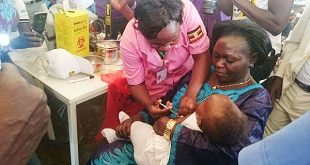
Kampala, Uganda | THE INDEPENDENT | Every year, the world commemorates World Hepatitis Day on the 28th of July as part of the efforts to raise awareness about this lethal but preventable viral disease that affects the liver causing liver cancer.
As Uganda joins the rest of the world to mark this day everyone is being urged to get tested for hepatitis B and C and get on treatment early before it is too late.
The call for persons to get tested is being sounded by a number of international experts who have worked around this chronic condition, especially in Africa where awareness levels remain too low about the three types of hepatitis particularly hepatitis C and B that can be treated by some of the antiretroviral drugs.
Expectant mothers are particularly urged to get tested and ensure that their newly born babies are vaccinated at birth.
This year’s theme is “We’re not waiting.” It calls for action to “accelerate elimination efforts of viral hepatitis now and the urgent need for testing and treatment for the real people who need it.
Other countries have adopted specific themes like “Don’t Wait to Get Tested for Hepatitis to Save your Life” Or “One life, one liver” One life, One Live is according to some experts spot on because hepatitis B and C attack the liver leading to liver cancer.
If patients get tested and know their status earlier, the condition can be treated but if you report late, you will utmost need a liver transplant to survive. Transplants are however quite costly and out of reach for most countries including Uganda.
Uganda is one of the countries with the highest prevalence of hepatitis globally.
In the 2005 Uganda National Serosurvey, the prevalence of hepatitis B was reported at 10%. In 2018, the prevalence was reported at 4.3% (5.6% among men and 3.1% among women).19 Oct 2022.
Worldwide 2 billion people are exposed to hepatitis B infection, 350 million have chronic infection, and 65 million are in sub-Saharan Africa.
Uganda is highly endemic with 10% national prevalence of hepatitis B infection.
Kenneth Kabagambe, the Founder and Executive Director of the National Organization for People Living with Hepatitis B said that most people associate hepatitis B with HIV.
Kabagambe suggests that everyone should get tested and that communities should avoid stigamisting people who test positive for hepatitis C and B. Kabagambe has personally suffered from stigma and stigmatization having declared his hepatitis status.
Over the years, Kabagambe has realized the lack of awareness about hepatitis. That the fact that many don’t know their status, they are reporting for treatment too late.
He has realized that viral hepatitis is not found in one location nor amongst one set of people; it is a truly global epidemic that can affect millions of people without them even being aware.
“ I thought that my wife is the one who infected me. Because she comes from a region with highest prevalence of hepatitis” he said
Northern Uganda is one of the regions with the highest prevalence of especially hepatitis B in Uganda. Hepatitis disease spreads through blood and bodily fluids.
Why is World Hepatitis Day important?
Viral hepatitis is one of the leading causes of death globally, accounting for 1.34 million deaths per year that’s as many as HIV/AIDS, tuberculosis, or malaria. Together, hepatitis B virus and hepatitis C cause 80% of liver cancer cases in the world.
Currently, 90% of people living with hepatitis B and 80% living with hepatitis C are not aware of their status. This can result in the real possibility of developing fatal liver disease at some point in their lives and in some cases, unknowingly transmitting the infection to others.
What Are Experts Suggesting?
Dr. Neliswa Gogela is a generalist with a special interest in liver disease from viral hepatitis.
She is based at the University of Cape Town in South Africa. She acknowledges that hepatitis B is a silent killer. She says hepatitis B can be transmitted from mother to child.
“Remember it is a blood-born infection. And these infections happen during delivery or early childhood in infancy where babies are dependent on their mothers for feeding,” said Neliswa.
She says hepatitis B is 100 times more infectious than HIV. “So if I have hepatitis B now, and I leave my blood on the surface, that virus will survive on the surface for about a week”
She suggests that expectant mothers that test hepatitis B positive should be given one of the common ARVS known as Tenofovir during the last trimester of pregnancy to prevent her from passing the virus to the baby. Newborns from a mother with hepatitis B should be given a vaccine at birth. “
“A simple message, pregnant women should have their hepatitis B status known. And if they are positive, Tenofvir is key.
Dr. Bilal Bobat, aSpecialist Gastroenterologist involved in the pre and post-care of liver transplant patients says most patients with live cancer in most parts of Africa hardly live for three months. He says most patients are presenting as young adults in the prime age of their economic life.
“They are often unaware of hepatitis diagnosis. And it is important to note that 50% of patients with liver cancer are hepatitis B related” he said “It is still the second most common of cancer-related deaths in men and the third most cause of cancer-related death among women”
“This is why hepatitis B awareness and hepatitis C awareness needs to be brought to the forefront” He believes that HIV has shown the world what can be done and that the same can be done with hepatitis.
Uganda has since 2015 been investing about US$ 3 million a year for mass free hepatitis B screening programme along with widespread community mobilization and awareness-raising actions.
By 2019, it was estimated that more than four million people had been screened. But only 30% of the population who are infected with hepatitis B are now aware of their status and can access comprehensive treatment services, including free medication.
While Uganda was among the first in Africa to reach and surpasses the 2020 target of 20%, it is not a guaranteed that it will eliminate hepatitis by 2030.
*****
URN
 The Independent Uganda: You get the Truth we Pay the Price
The Independent Uganda: You get the Truth we Pay the Price


